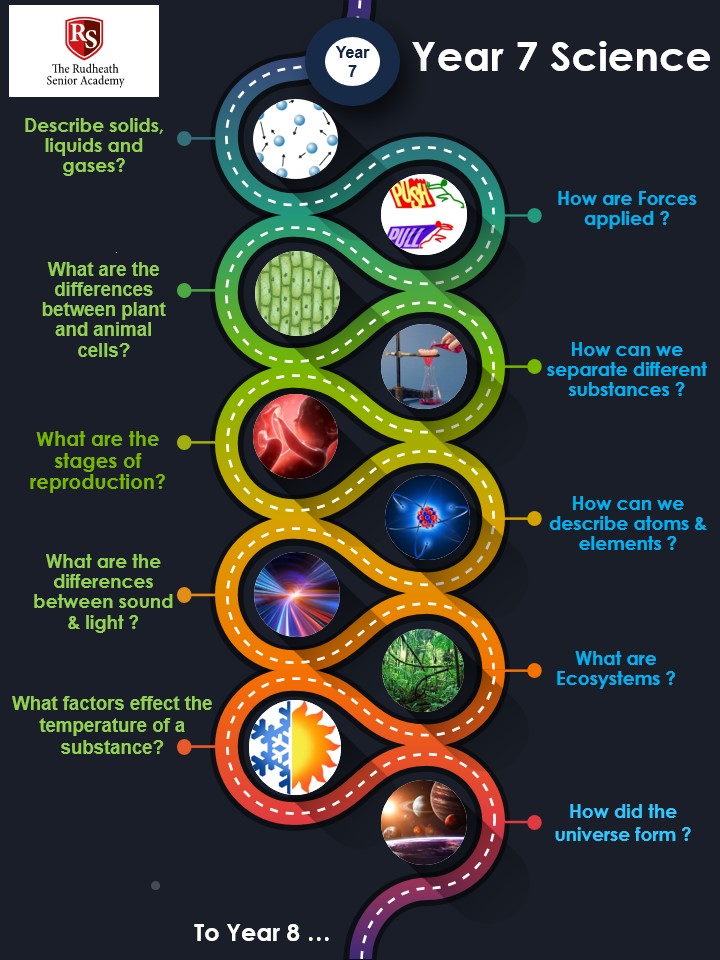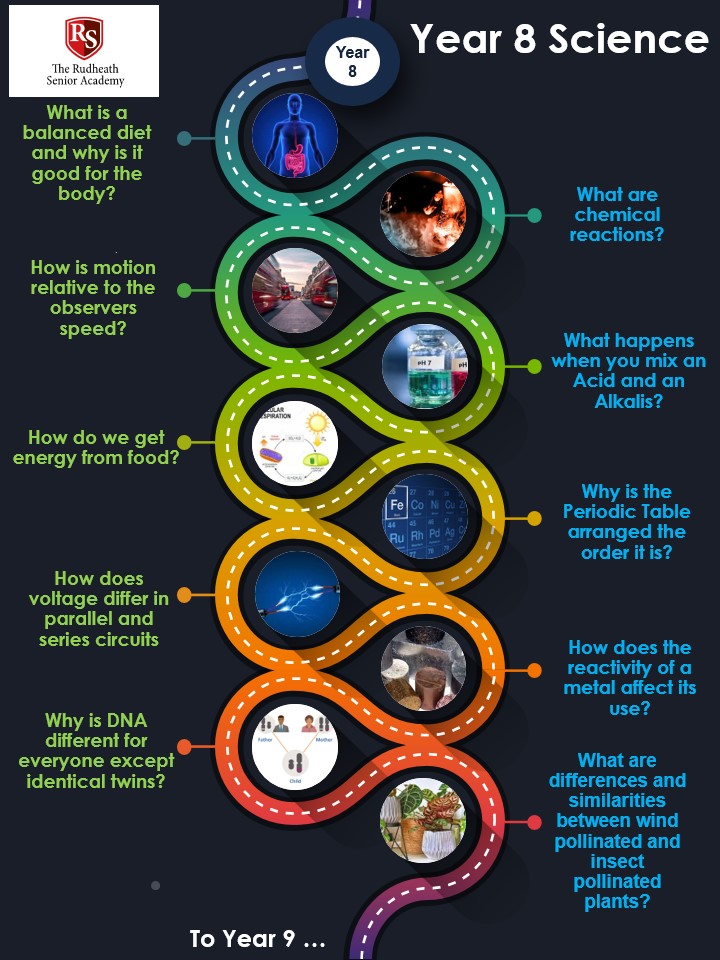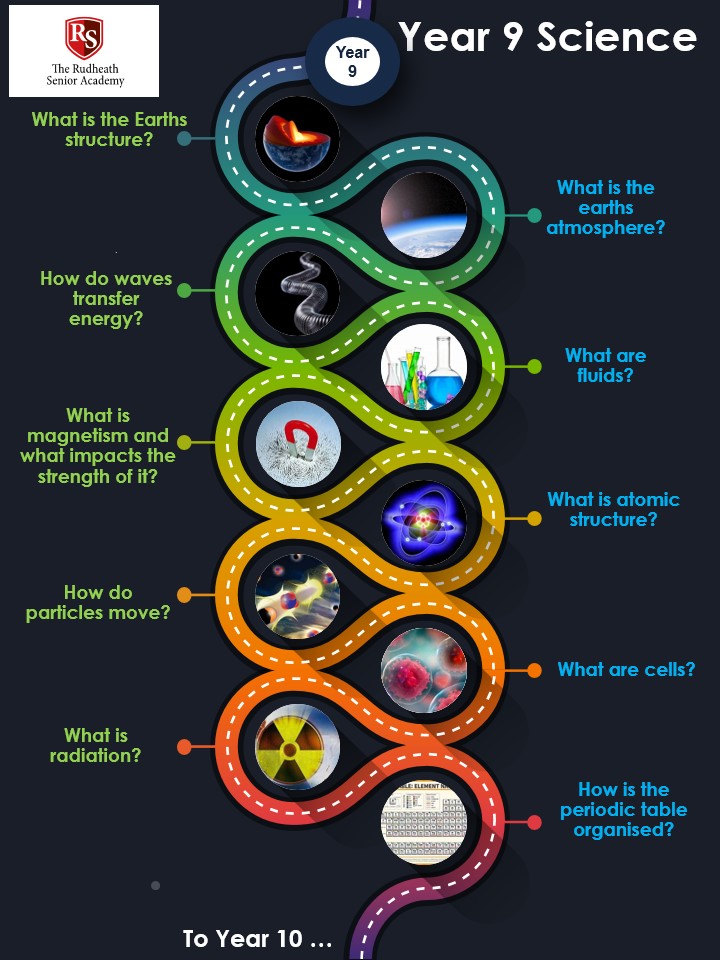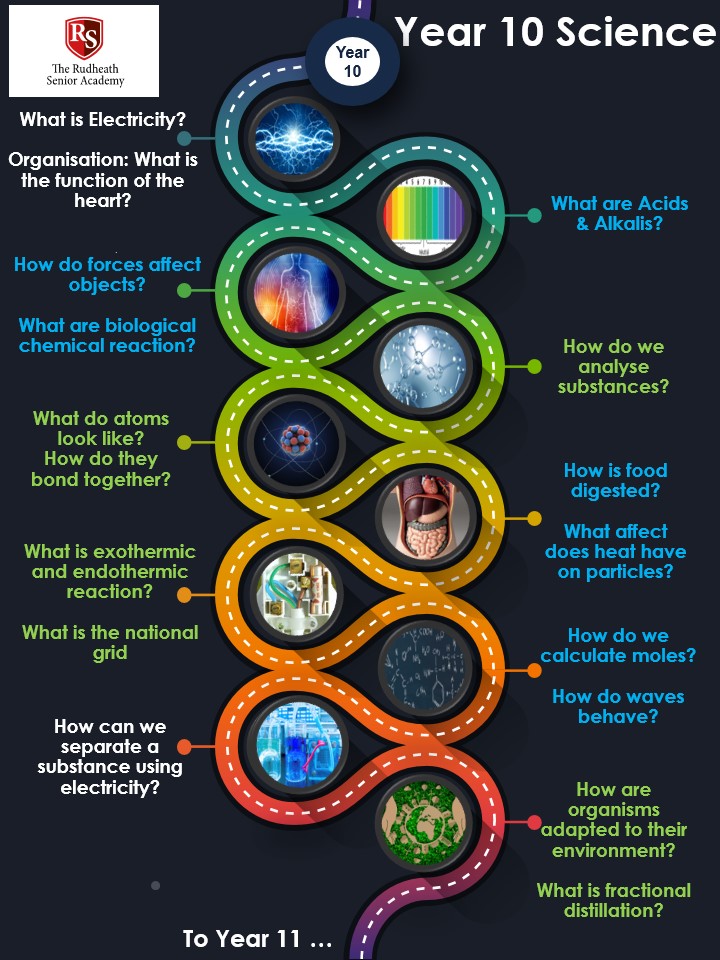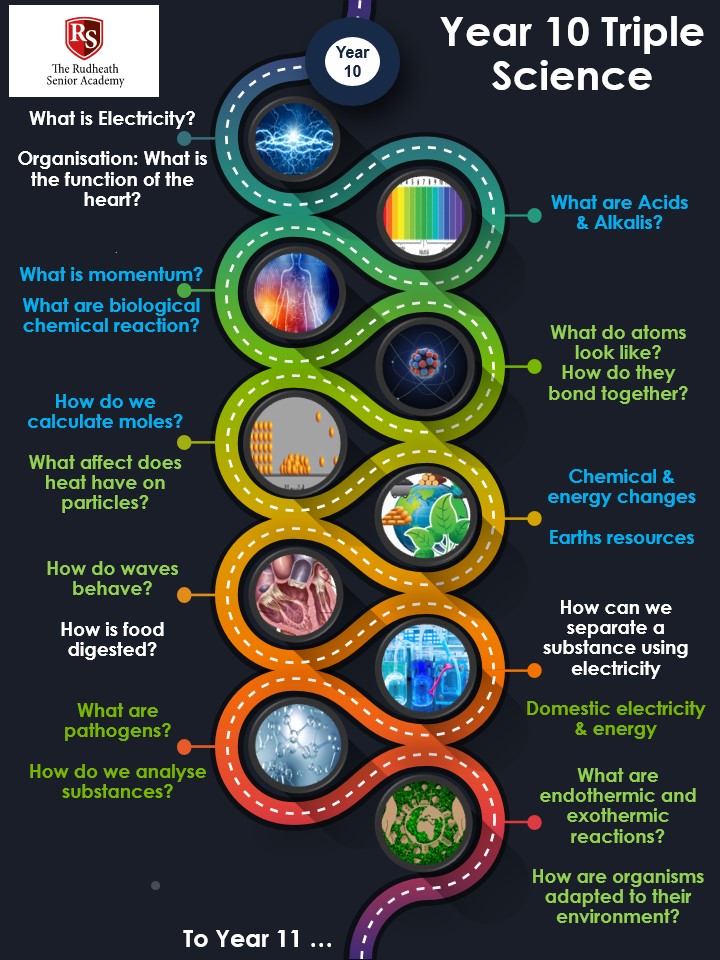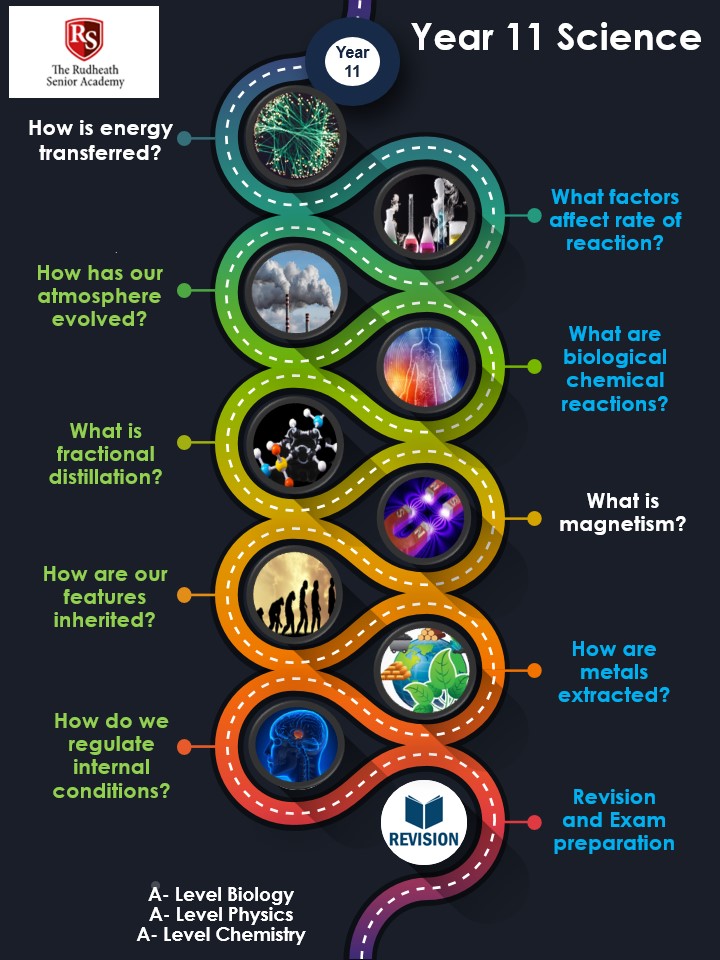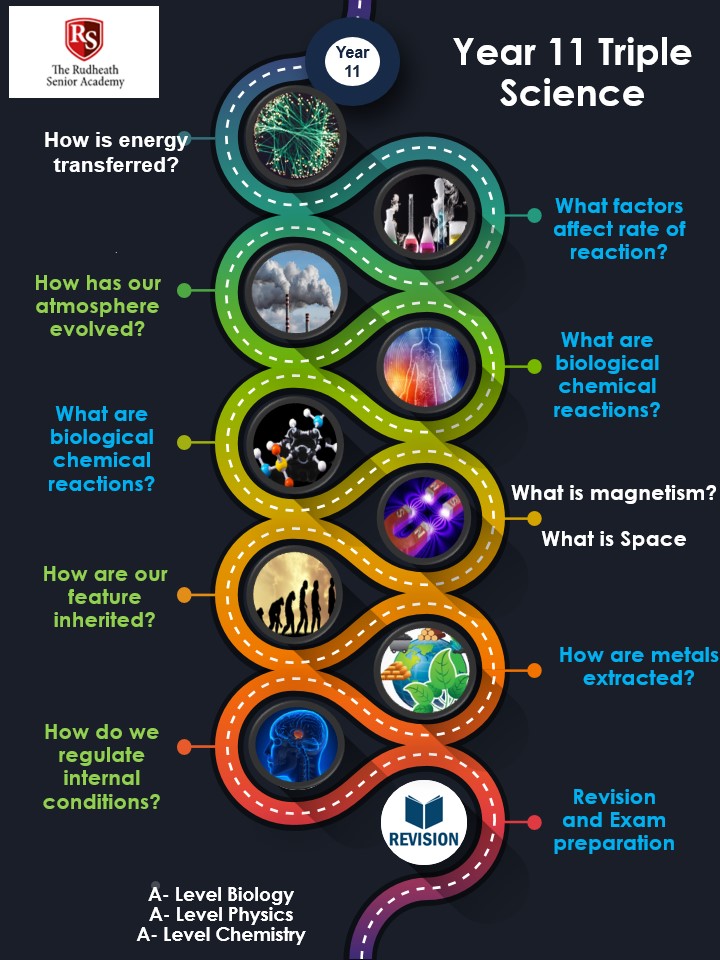
Science
The purpose of the science curriculum is to develop children’s scientific understanding so they can be scientifically informed citizens and, if they wish, pursue careers in science, or in careers that require some scientific understanding. To be scientifically informed requires a broad knowledge of scientific ideas, an appreciation of how experimentation and observation develop this knowledge, and an ability to think rationally and analytically when applying this knowledge in new contexts.
As scientists at Rudheath Senior Academy, we aim to develop a sense of excitement and curiosity around our everyday lives.
Our vision is “To challenge what we think we know, discover what we don’t yet know, and develop the knowledge and skills to transform our futures.”
We recognise that a solid grounding in scientific knowledge is the key to unlocking the mysteries of the world. This is fundamental for our pupils understanding of their place within it.
We teach this through the specific disciplines of biology, physics and chemistry.
Science has changed our lives, as is ever more evident over the past few years. This has shown our reliance upon but also the magnificent contributions that great scientists can make to us all.
Our curriculum is built upon this knowledge, to ensure our pupils also recognise the power of science and the importance of it to our future prosperity.
A key priority of our science department is to provide a high-quality knowledge-rich curriculum for all pupils.
Our curriculum is carefully sequenced over KS3 and KS4 to develop the knowledge needed to prepare learners for GCSE, A-level and beyond. Pupils are consistently provided with opportunities to revisit key knowledge to ensure deep and meaningful learning takes place throughout their science journey.
We are passionate about providing opportunities for enrichment and STEM, to equip learners with the knowledge and cultural capital to become educated citizens. This is evident throughout our curriculum, in the offers we make to pupils and the experiences we provide.
Underpinning all we do is our academy ethos of excellence and kindness: to be our very best version of ourselves.
The Science curriculum has been designed and sequenced to promote a cumulative development of knowledge, skills and understanding both within and across activities and Key Stages.
Careful consideration has been given to ensure a logical and strategic sequence of learning throughout the Key Stages. Our chosen focus is based on STEM best learning of the key ‘Big ideas’ of the three science disciplines. This allows the pupils to clearly see what topics within each of the sciences are linked and how the knowledge builds on one another throughout Year 7 – 11.
The Science curriculum has also been designed to allow ‘gaps’ in progression to be addressed over the Key Stages and to achieve coherence and continuity in students’ learning across the breadth of the subject and the Key Stages.
In addition to the progressive sequencing of knowledge we ensure that there is consistent retrieval practice throughout. This enables gaps in knowledge and misconceptions to be addressed to ensure coherence and allows the building blocks of key concepts to become embedded in the learning of science for our pupils.
To support deeper learning within our curriculum, staff use metacognitive strategies to help pupils to succeed in their lessons.
Students become increasingly independent from Years 7 – 11, building confidence in practical and data handling skills and greater depth of understanding in each topic.
This involves a series of steps within each lesson that begins with activating prior knowledge and leading to independent practice before ending in structured reflection.
These are based on Barak Rosenshine’s Principles of instruction.
- STRONG START – Teachers meet and greet pupils at the door. Clear seating plans in place. Each lesson starts with a knowledge drill (review of relevant prior knowledge to activate schemata ready to build new knowledge into long term learning). This is reviewed using green pens.
- Learning question.
- Small amounts of new knowledge are presented at a time with the opportunity for students to then practice this new material.
- Regular, extensive questioning of all students using strategies such as wait time, cold calling and no opt out. Students are targeted, there is not a focus on those who put hands up to answer. There is no accepting of “don’t’ know” as an answer, staff ensure high expectations of engagement in learning.
- Model answers and worked examples are regularly provided where appropriate.
- Give students opportunities for extensive, successful, independent practice.
- Use formative/summative assessment and feedback-next steps to secure students’ progress.
- Reflection of learning question – to check pupils knowledge and understanding from the lesson.
- Follow Behaviour for Learning protocols .
- Use of knowledge organisers - provided for pupils at the start of each topic. Teachers encourage the regular use and reflection of knowledge organisers within class and through homework tasks.
- STRONG FINISH – ensure all books, etc, packed away and all pupils calmly wait behind desks to be dismissed.
Assessment incorporates consistent spaced learning of key content and skills and requires all learners to be challenged; to cement their understanding of relationships between related ideas. There is a constant revision of the key science knowledge needed over time. There are focussed recap weeks and teaching staff will use interleaving , constantly making links to prior learning in lessons to build upon student schemata and aid memory. This is seen in the consistent opportunities for low stakes testing through the use of knowledge drills where pupils use retrieval to activate prior knowledge and embed key knowledge.
Our assessment plan offers plenty of opportunity for retrieval practice and assessment of long term learning. It is also designed to support students in being able to successfully approach assessments using more teacher led methods at KS3 to developing more independent practice later on. We also use assessments to improve the quality of written work in science using extended questions throughout years 7 – 11.
Year 7
Pupils complete five end of topic assessments (each half term), which focus on knowledge recall and application. These test papers are more teacher led to support pupils in accessing KS3 exam style questions. Pupils then mark these with support from teacher and complete relevant follow up questions which focus on their areas of weakness.
Each test will contain synoptic questions about previous content so will gradually increase in length, with the final end of year test assessing their learning over the previous year.
Year 7 pupils will also complete an extended question for each topic, which is then assessed for knowledge and literacy.
Year 8
Pupils will again complete five end of topic assessments (each half term), which focus on knowledge recall and application. These test papers are completed more independently by pupils. Pupils then mark these using the mark scheme and again complete relevant follow up questions which focus on their areas of weakness.
Each test will contain synoptic questions about previous content so will gradually increase in length, with the final end of year test assessing their learning over the previous year.
Year 8 pupils will also complete an extended question for each topic, which is then assessed for knowledge and literacy.
Year 9
Assessments take place at the end of every topic and with pupils working independently on these although teacher support may be given if needed especially at the start of introducing content for GCSE. Extended questions now take the form of GCSE exam style questions (6 mark questions), which are marked for literacy and scientific knowledge. These are modelled and scaffolded by the teacher to support pupils in how to best answer these style of questions.
Year 10
Pupils complete a GCSE style test every topic. Higher and foundation papers are used at this point.
6 mark GCSE exam questions also continue to be used every topic.
Pupils complete formal mock exams at the end of the year to access Paper 1 biology, physics and chemistry content.
Year 11
Pupils continue to complete a GCSE style test every topic, with higher and foundation papers used.
6 mark GCSE exam questions are also used every topic to access literacy and scientific knowledge.
Pupils complete full GCSE examination papers throughout the year with formal mock exams in November and March to help them prepare for their GCSE’s.
KS3: At the start of each topic pupils are set 10 science specific vocabulary words. They should learn the spellings and definitions of these using the ‘look, cover, check’ method in preparation for a spellings and meanings test the following week.
For their following homework pupils will be set a test involving 10 multiple choice questions to assess their learning within that unit. They are to use their knowledge organisers to assist with this, again using the look, cover, check method of revision before attempting the multiple choice test.
KS4: At the start of each topic pupils are set 10 science specific vocabulary words. They should learn the spellings and definitions of these using the ‘look, cover, check’ method in preparation for a spellings and meanings test the following week.
They should try and repeat this to ensure this remains in their long-term memory.
Pupils will then be set relevant multiple choice tests through Seneca learning. For this they should use their knowledge organisers as a means of revising for this.
www.senecalearning.com
Logon details: Students can find their logon details through their relevant Year TEAM on Microsoft TEAMS.
Enrichment
We are currently developing an enrichment programme in science that not only continues our work with STEM ambassadors but also provides a variety of experiences such as working on our own allotments and caring for animals in our mini zoo.
We are also hoping to offer a science crest award and a meaningful science related trip for each year group. Within school we will develop the pupil’s experiences further with STEM related experience days with leaders in their field coming to share their jobs and experiences with our pupils and external visitors such as Zoolab coming to add extra excitement and experience to our subject.
We as a department are passionate about improving the science capital of our young people so they are equipped with the knowledge and skills for the next stage of their journey.
All teachers have high expectations of all our pupils, in terms of their standards and behaviour and in respect to their own progress within science.
We understand the importance of equipping pupils with the scientific knowledge and skills to understand and question the world around them.
The subject of science at Key Stage 5 can be linked to a variety of different fields, from those well-known academic pathways such as aerospace, engineering, medical, to less well known connections such as fashion and beauty.
We would hope that pupils will go on to choose to study higher education in the form of A levels in Biology, Physics or Chemistry or diploma courses such as animal management at college.
- If studying science at A level, with aspirations to study science further at university, then pupils should be encouraged to consider doing A level maths.
- More detail can be found for this on the UCAS website: https://www.ucas.com/


